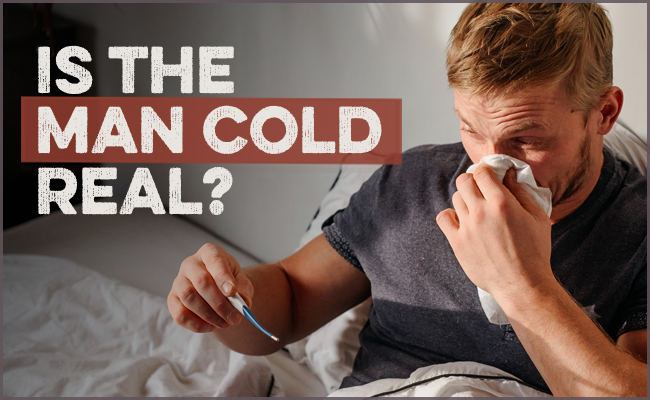
Flu and cold cases are at all-time highs this year. I got the flu two years ago. Never felt sicker in my life. It was awful.
Kate got it too, and felt nigh near to death’s door at times, but she seemed to recover faster than I did and wasn’t moaning and groaning as much as I was. She was in bed for a couple days and then was back to work. Meanwhile, I was holed up in our bonus room upstairs for a week, alternating between Tylenol and Advil to manage the fever and body aches.
Kate has always teased me about being overdramatic about my symptoms whenever I get sick.
But, truth be told, I don’t think I’m exaggerating. I genuinely feel damned awful when I come down with something, and all I want to do is moan and lay in the “sick hole” upstairs for days.
Other couples have noticed a discrepancy between how men and women experience sickness — with men seeming to have more severe symptoms while women can power through the sniffles without missing a beat. So much so that we’ve named how men experience sickness as the “man cold” or the “man flu.”
But is the man cold actually a thing?
Do Men Get Sicker Than Women?
Many people have noticed that guys seem to feel sicker and feel sicker longer than women do when they get the flu or cold. And there are clinical studies that bear these observations out.
According to one study about the differences between men and women when they get the flu, women report more flu symptoms than men, meaning that while a guy might just have a fever and body aches when he gets sick, a woman might have both those symptoms plus cough, headache, runny nose, etc. But men are two times more likely to be hospitalized when they get the flu, which suggests that of the symptoms they do experience, they experience them more severely.
You saw this pattern with COVID-19 during the pandemic. Around the world, severe cases of COVID were predominantly among men, with men’s mortality rates 1.6 times higher than women’s. (It’s worth noting that some of this difference may be due to men generally having poorer health and being more likely to delay seeking medical care when COVID symptoms worsened.)
Surveys have suggested that men take about 1.5-1.7 days longer to recover from the flu than women. But other studies have shown that men recover faster from the flu than women.
So, based on some studies, men do experience more severe symptoms, for longer. Man flu/cold might be a thing.
But why would there be sex differences between how men and women experience sickness?
Blame the Man Cold on Testosterone and (Low) Estrogen
It all comes down to sex hormones. At least, that’s what the research suggests.
Testosterone, which men typically have 10-20X more of than women, can be a double-edged sword. While it increases muscle mass and puts hair on your chest, it also suppresses inflammatory cytokines like IL-6, potentially prolonging recovery from the flu by delaying viral clearance.
Testosterone also gives men a larger hypothalamus region, which, among other things, regulates body temperature. Scientists theorize that this enlarged hypothalamus could explain why men often report higher fevers during infections. And because fever drives some of the unpleasant symptoms of the flu or a cold, like chills and body aches, more severe fevers mean a more severe sickness.
Estrogen also plays a role in immune function. It seems to boost it. While men have estrogen, they don’t have anywhere near the same amount as women. Women’s elevated estrogen levels seem to enhance antiviral responses by boosting interferon-γ production, which slows down viral replication in illnesses like the flu. The retardation of viral replication can take the edge off of symptoms in women. What’s interesting is that this female hormonal advantage diminishes after menopause, when estrogen levels go down in women. Postmenopausal women have an immune response that aligns more closely with men’s.
Other studies show that women have additional immunity advantages over men, like stronger innate (first-line defense) and adaptive (targeted) immune responses. This can help clear infections faster.
So, men’s high testosterone makes them more prone to getting sicker longer, while elevated estrogen in women helps blunt the severity of symptoms and helps them recover faster.
Scientists hypothesize that these hormonal differences between men and women are evolutionary in origin and represent a “reproduction-immunity trade-off.” Females evolved to have less testosterone but stronger immunity to protect offspring during pregnancy and breastfeeding; men evolved to have more testosterone, giving them weaker immunity to disease but greater strength and drive for the tasks of hunting and fighting.
Is Man Flu Just in Your Head?
While many scientists think that man flu is real and biologically rooted, others argue it’s psychosomatic. In other words, man flu is all in your head, man.
A study from the University of Glasgow suggests that men are less in touch with their biofeedback signals (which helps in understanding how one’s body feels), which could result in reporting that their symptoms are more severe than they truly are.
Another study suggests that men and women objectively experience the same severity and duration of flu and cold symptoms, but men subjectively rate some of them as more severe and longer-lasting. The study examined how the sexes experienced the common cold and found that while men and women experienced physical symptoms (like nose and ear issues) similarly, men reported emotion-based symptoms, such as mood changes and psychological distress, as being more severe. The researchers of this study concluded that the man cold is just in dudes’ heads.
Why would men subjectively experience more severe cold symptoms? Some researchers theorize that because men are conditioned to be stoic, tough, and productive, and to power through things, when they do experience a sickness, they see it as an opportunity to take a break from these expectations; they amplify the severity of their symptoms to elicit sympathy, get taken care of for once, and justify taking off work.
I’m not sure I buy that, but that’s the argument.
Perhaps it’s the case that, since women historically were responsible for the lion’s share of childcare, which creates urgent obligations (kids still need to be fed and diapered even when their parents are sick), it’s more ingrained in women to bounce back and make sure the family is tended to. Is that difference rooted in evolutionary biology, cultural expectations, or a mixture of both? There’s no conclusive evidence to know.
How to Treat the Man Flu/Cold
Personally, I think the man flu/cold is a thing — an actual biological phenomenon. It’s been interesting to watch how my son Gus’ experience of sickness has changed as he’s moved from boyhood to teenagehood. As a boy, he’d get sick and be down for a day or two. Now that he’s 14, and has testosterone coursing through his veins, he experiences sickness like I do. He feels like garbage, and he’s out for longer. He just wants to go up to the bonus room and be by himself to wallow and moan and groan. Whenever either of us gets a bad cold or flu, we just tell the family, “Well, I’m off to the sick hole. See you when I feel better.”
You treat the man version of the cold or flu just as you would its female counterpart; do the stuff your mom told you to do when you were a kid:
- Drink plenty of fluids. Water is best, but you gotta get some ginger ale in there. It’s a miracle elixir.
- Keep your eating light. Soups and saltine crackers are clutch.
- Avoid caffeinated drinks.
- Get plenty of sleep and rest.
- Alternate between Tylenol and Advil to manage pain and fever.
- Watch The Price is Right and The Young and the Restless.
Most colds and flu bouts take about 4-7 days to clear. You could experience lingering fatigue for up to two weeks.
When you feel the first symptoms of sickness, take an at-home test to see if you’ve got the flu, cold, or COVID. If it’s the flu, get a prescription for xofluza. Taking it within 48 hours of your first flu symptoms can reduce their severity and duration.
While whether the man flu is an actual physiological thing or just in guys’ heads is up for debate, doctors all agree that we shouldn’t label men as whiny when they get sick because it could delay men getting the care they need to get better, which could result in worse outcomes — including death. Be sure to go see a doctor if:
- Your fever reaches 104 degrees Fahrenheit or higher or is above 100 for over three days.
- You have difficulty breathing or chest pain.
- Your symptoms get worse after an initial improvement.
- Your symptoms last longer than three weeks without improvement.
Trying to tough out a sickness and continue your normal routine isn’t wise; it will just prolong the sickness and delay your recovery. In keeping your sickness lingering on for longer, you’ll actually lose more productivity in the long run than just completely taking time off and letting yourself heal up. It’s in your best interest, and in the best interest of your family, who wants to see you bounce back as quickly as possible, to hit your rest and recovery hard. At the same time, your household may be hurting without your help, so don’t wallow unnecessarily, and once you’re ready, get back in the saddle.







